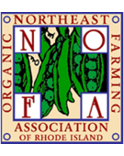Avian Flu

Dr. Scott Marshall, DVM RI State Veterinarian
Here is a poultry alert from Dr. Scott Marshall, our RI State Veterinarian:
Dear Poultry Stakeholder;
As you are probably aware, the current outbreak of Highly Pathogenic Avian Influenza (HPAI) is spreading in our country. I would like to remind you that HPAI is a disease that requires mandatory reporting to state and federal animal health officials. Therefore, if you suspect that your birds are infected with HPAI please contact my office so that we can confirm infection and take appropriate protective actions.
This current outbreak in the USA originated in the Pacific Northwest in late 2014. The virus was detected in wild birds, backyard flocks, and eventually commercial poultry flocks. These cases were associated with flight patterns of migratory waterfowl along what is known as the Pacific flyway. There are several strains of the virus that are now being detected east of the Rocky Mountains, closely associated with the Mississippi flyway. There are several major migratory bird flyways that cross the country and there is overlap of the flyways, so it appears that the source of this virus is wild waterfowl and that the spread is related to waterfowl migration along established flyways. RI is in the Atlantic flyway. Thus far, there have not been any reports of HPAI in states associated with the Atlantic flyway, but animal health officials believe it is only a matter of time.
Animal health officials have enhanced surveillance in wild waterfowl and we continue to conduct surveillance in domestic poultry. Hopefully we may have some warning by detecting the virus in wild waterfowl, but in all likelihood the virus will arrive without warning. Therefore, I am asking you all immediately evaluate the risk to your poultry and take steps to mitigate that risk. The USDA Animal Health page offers several timely links to avian influenza and practices that everyone can take to protect their flocks. Please review this information and redouble your efforts to protect your birds. I also want to direct you to the state’s response plan if HPAI is detected. See that plan here.
In summary, HPAI is a serious issue. If detected, state and federal animal health officials are obligated to respond. Detection of the virus has obvious animal health implications since there is high mortality associated with infection in domestic poultry, but there are also interstate and international trade implications since other states and countries may refuse entry of poultry from affected areas, especially if they feel that the affected area lacks the means of identifying and/or responding to the disease. Therefore, I am asking you to take the necessary precautions to protect your animals, even if that means restricting access to your flock, not attending auctions or shows, or not buying animals from high risk sources, like auctions. I am also reminding you all that my office is here to assist you if you are experiencing mortality in your flock since a timely diagnosis and appropriate response will limit the spread of the disease.
SCOTT N. MARSHALL, DVM
Rhode Island State Veterinarian
Department of Environmental Management
Division of Agriculture/Animal Health
235 Promenade Street
Providence, RI 02908
(401) 222-2781
scott.marshall@dem.ri.gov
Learn more about avian influenza here.
